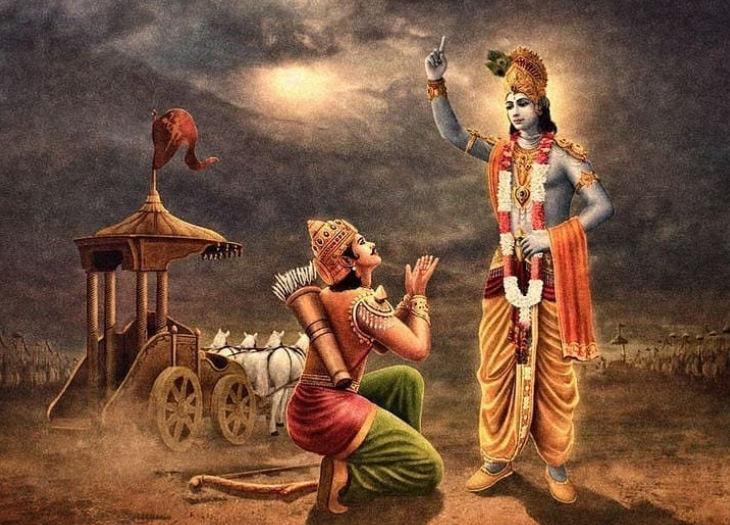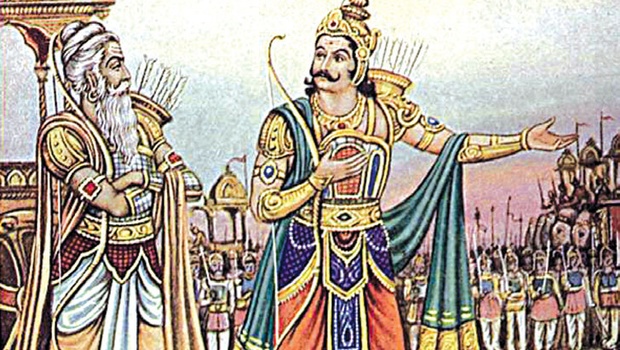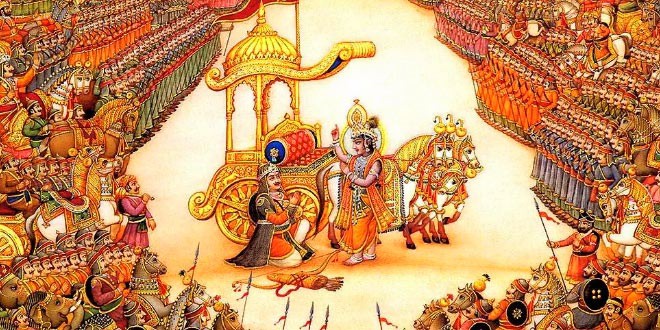Namaste!
In the last part of this series, we explored Bhagavad Gita Chapter 3, verses 22 to 30, where Lord Krishna shared the profound wisdom about the significance of performing one’s own duties, swadharma. Now, let’s continue into the teachings from Chapter 3, verses 31 onwards in this post.
Chapter 3, Verse 31
ये में मतमिदं नित्यमनुतिष्ठन्ति मानवाः।
श्रद्धावन्तोऽनसूयन्तो मुच्यन्ते तेऽपि कर्मभिः।।3.31।।
ye me matam idaṁ nityam anutiṣhṭhanti mānavāḥ śhraddhāvanto’nasūyanto muchyante te’pi karmabhiḥ
English Translation:
Those who follow this teaching of mine with faith and without envy, being dedicated and free from malice, are released from the bondage of karma, O Arjuna.
Commentary:
In this verse, Lord Krishna emphasizes the path to liberation through devoted action. Those who faithfully follow Krishna’s teachings, free from jealousy and ill will, and engage in selfless actions, break free from all karmic bondage. By practicing selfless actions with sincerity, one can escape the cycle of birth and death. This verse highlights the significance of faith, dedication, and compassion on the spiritual journey toward self-realization.
It is beautiful to note the humility expressed by Lord Krishna here. He refers to His teachings as “opinions” even though these are universal facts! An opinion is a personal view, but the views expressed by Lord Krishna in these verses are universal truths. Through this, He teaches us humility.

Chapter 3, Verse 32:
ये त्वेतदभ्यसूयन्तो नानुतिष्ठन्ति मे मतम् |
सर्वज्ञानविमूढांस्तान्विद्धि नष्टानचेतस: ||
ye tv etad abhyasūyanto nānutiṣhṭhanti me matam sarva-jñāna-vimūḍhān tān viddhi naṣhṭān achetasaḥ
English Translation:
But those who, out of envy, disregard these teachings and do not practice them regularly, are to be considered bereft of all knowledge, befooled, and doomed to ignorance.
Commentary:
In this verse, Lord Krishna highlights the consequences for those who envy and reject His teachings without practicing them regularly. Such individuals are described as “bereft of all knowledge”- sarva-jñāna-vimūḍhān – signifying their spiritual ignorance. Their actions are driven by envy and a lack of understanding, leading them away from the path of self-realization. These individuals are considered deluded (achetasaḥ) and are doomed to remain ensnared in the cycle of ignorance and suffering. Lord Krishna highlights the importance of not only receiving spiritual knowledge but also diligently practicing it to attain wisdom and liberation from the material world.
Contemplating on this, we find that karma yoga, the path of performing prescribed actions – swadharma– is suitable even for those pursuing jnana yoga, the path of acquiring knowledge. Karma yoga proves apt due to its simplicity, resilience to failure, and independence from other methods. Conversely, jnana yoga is intricate, susceptible to setbacks, and necessitates some karma yoga to maintain physical well-being. This emphasizes the importance of individuals well-versed in Vedic wisdom setting an example to inspire and benefit the common populace. The subsequent part of this chapter elaborates on the challenges and hazards faced by practitioners of jnana yoga.
Chapter 3, Verse 33:
सदृशं चेष्टते स्वस्या: प्रकृतेर्ज्ञानवानपि |
प्रकृतिं यान्ति भूतानि निग्रह: किं करिष्यति ||
sadṛśhaṁ cheṣṭate swasyāḥ prakṛter jñānavān api prakṛtiṁ yānti bhūtāni nigrahaḥ kiṁ kariṣhyati
English Translation:
Even a person of knowledge acts according to their own nature, for all living beings are driven by their natural tendencies. What will one gain by repression?
Commentary:
In this verse, Lord Krishna addresses the inevitability of individuals acting in alignment with their inherent nature, often referred to as their gunas. He suggests that even a person possessing knowledge and wisdom will naturally tend to act in harmony with their ingrained disposition. This inclination arises because human beings are intrinsically influenced by their innate tendencies, which significantly impact their actions. Lord Krishna employs a rhetorical question, “What can one achieve by suppressing such deeply-rooted natural tendencies?” to emphasize the impracticality and counterproductiveness of trying to completely repress one’s inherent nature. Instead, He advocates for a more constructive approach – channeling these innate tendencies positively through the practice of karma yoga. By aligning actions with one’s swadharma (prescribed duties), individuals can navigate the complexities of life more effectively and achieve spiritual growth. This timeless advice holds great significance in today’s world, where understanding and harmonizing with one’s nature is more relevant than ever.
Chapter 3, Verse 34:
इन्द्रियस्येन्द्रियस्यार्थे रागद्वेषौ व्यवस्थितौ |
तयोर्न वशमागच्छेत्तौ ह्यस्य परिपन्थिनौ ||
indriyasyendriyasyārthe rāga-dveṣhau vyavasthitau tayor na vaśham āgachchhet tau hyasya paripanthinau
English Translation:
Attraction and repulsion arise when the senses come into contact with their objects. One should not fall under the control of these two, for they are the obstacles of one’s spiritual journey.
Commentary:
In the prior verse, Lord Krishna discussed how our minds and senses are naturally inclined, and trying to suppress these inclinations isn’t practical. Now, He introduces a different perspective – the possibility of harnessing these natural tendencies. He emphasizes that as long as we inhabit a material body, it’s essential to use the sensory objects for our bodily maintenance. Krishna doesn’t advocate abstaining from necessary sensory interactions but advises us to manage attachment and aversion. He encourages maintaining equanimity and not letting these dualities dictate our actions. By transcending the sway of attraction and repulsion, we can navigate life’s challenges with a composed mind, fostering our spiritual growth. This wisdom is particularly crucial when dealing with worldly temptations and aversions.
Chapter 3, Verse 35:
श्रेयान्स्वधर्मो विगुण: परधर्मात्स्वनुष्ठितात् |
स्वधर्मे निधनं श्रेय: परधर्मो भयावह: ||
śreyān swa-dharmo viguṇaḥ para-dharmāt sv-anuṣṭhitāt swa-dharme nidhanaṁ śreyaḥ para-dharmo bhayāvahaḥ
English Translation:
It is better to perform one’s own duties imperfectly than to master the duties of another. By fulfilling the responsibilities prescribed by one’s own nature, one avoids the dangers associated with neglecting one’s own duties and pursuing another’s duties.
Commentary:
In this verse, Lord Krishna imparts valuable wisdom regarding the importance of swadharma, which signifies one’s prescribed duties or roles in life. He advises that it is superior to faithfully execute one’s own duties, even if they are imperfectly performed, rather than attempting to excel in the duties of others. By steadfastly fulfilling the responsibilities aligned with one’s inherent nature, individuals can avoid the perils and anxieties associated with neglecting their own duties and adopting those of others. This teaching highlights the significance of embracing one’s unique life path, as it leads to spiritual growth and liberation. It emphasizes that each individual possesses a distinct role to play and should wholeheartedly focus on fulfilling it. This message is particularly relevant in today’s world, where authenticity and uniqueness are often challenged, and societal expectations can steer individuals away from their true calling.
Chapter 3, Verse 36:

अर्जुन उवाच |
अथ केन प्रयुक्तोऽयं पापं चरति पूरुष: |
अनिच्छन्नपि वार्ष्णेय बलादिव नियोजित: ||
arjuna uvāca | atha kena prayukto’yaṁ pāpaṁ carati pūruṣaḥ | anichchhann api vārṣhṇeya balādiva niyojitaḥ ||
English Translation:
But impelled by what, does one commit sinful acts, O descendant of Vrishni, even involuntarily, as if engaged by force?
Commentary:
After listening to Shri Krishna’s teachings in the previous verses, Arjuna, seeking clarity, poses a profound question to Lord Krishna. He is perplexed by a common human dilemma: the occurrence of sinful actions even when individuals do not wish to commit them. Arjuna compares this inner conflict to a force akin to a mighty wind that appears to compel a person into sinful deeds, much like a powerful wind that directs a ship without the crew’s consent. This inquiry delves into the complexities of human nature and the struggle between one’s desires and their ability to control them.
We will see what Lord Krishan replies to Arjuna in the next week.
ॐ पूर्णमदः पूर्णमिदं पूर्णात्पुर्णमुदच्यते पूर्णस्य पूर्णमादाय पूर्णमेवावशिष्यते ॥ ॐ शान्तिः शान्तिः शान्तिः ॥
Om Puurnnam-Adah Puurnnam-Idam Puurnnaat-Purnnam-Udacyate Puurnnasya Puurnnam-Aadaaya Puurnnam-Eva-Avashissyate || Om Shaantih Shaantih Shaantih || My Pranams to you!

